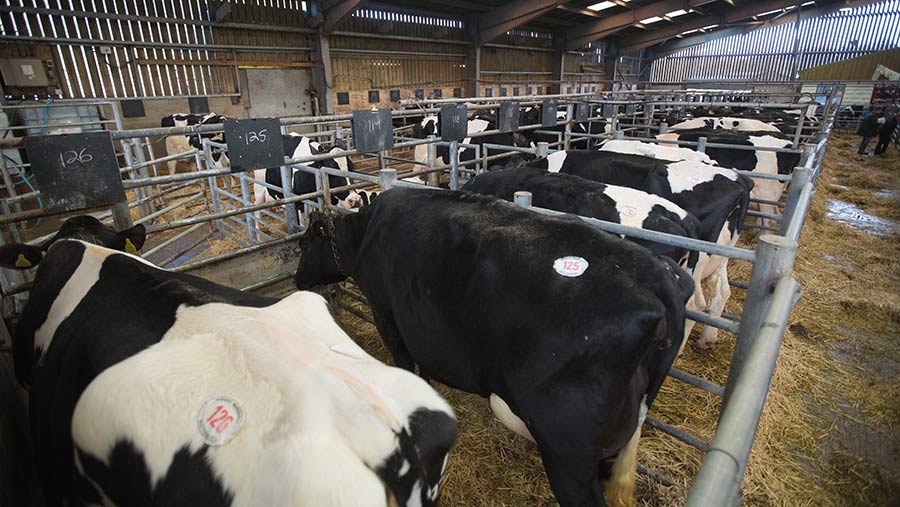Heifer values rebound with milk price rises
 © Tim Scrivener
© Tim Scrivener Milk price increases have improved confidence around the dairy rings at regional saleyards, recovering some of the 12% drop in values seen in August and September.
Milker values, like liquid milk, are on a rising market and look to have recovered about £150 of the £250-£300 they lost after peaking in June.
Auctioneers say flying herd policies and TB culling are keeping up demand nationally, while cattle remain tight across Europe and imported heifers are scarce.
See also: Arla adds 3p/litre on to December farmgate milk price
EU numbers are tight
Demand is huge and outstripping supply across Europe, says Mark Lee of Norton and Brooksbank, who is struggling to compete with dealers across the continent.
Wagonloads of EU cattle are few and far between, with serious demand from Polish, Italian and Portuguese dealers and Dutch farmers.
“Dutch farmers now want to come over to buy UK cows,” Mr Lee said, adding that an export facility on the EU side (possibly Calais) was needed to export UK stock.
He said imported heifers were 18% dearer, with 30-litre heifers now costing UK farms closer to £2,000 delivered, rather than about £1,700.
Opening £2,000 bid
Fred Spurgeon of Gisburn Auction Marts said two importers had been buying out of Gisburn’s dairy ring since the summer as they could not source foreign cattle.
He said the “milk price lag”, after costs rose in the summer, had stifled trade in the autumn as farms faced higher contractors’ bills, rising feed costs and, in some places, cash flow difficulties. Buyers were forced to work to strict budgets.
He said: “Trade has firmed in the past three weeks and I hope it doesn’t put the importers off from coming. Any 30-32-litre heifer was £2,000 at the last sale – we even had an opening bid of £2,000. I think the trade will be with us until Christmas at least.”
Prevent an exodus
Glyn Lucas, senior dairy auctioneer at Harrison & Hetherington, said industry consolidation and more people exiting the industry were likely unless processors gave 40p/litre.
“I don’t think the public want more consolidation, or the processors,” Mr Lucas said, adding that replacement cost (cull cows and beef-cross calves) also needed to increase with inflation.
Borderway’s trade peaked in June at more than £2,200 and then dropped 12%. However, November’s mid-month dairy sale heifers levelled at £1,737 and the Border and Lakeland Club sale levelled at £2,022 – something of a recovery.
